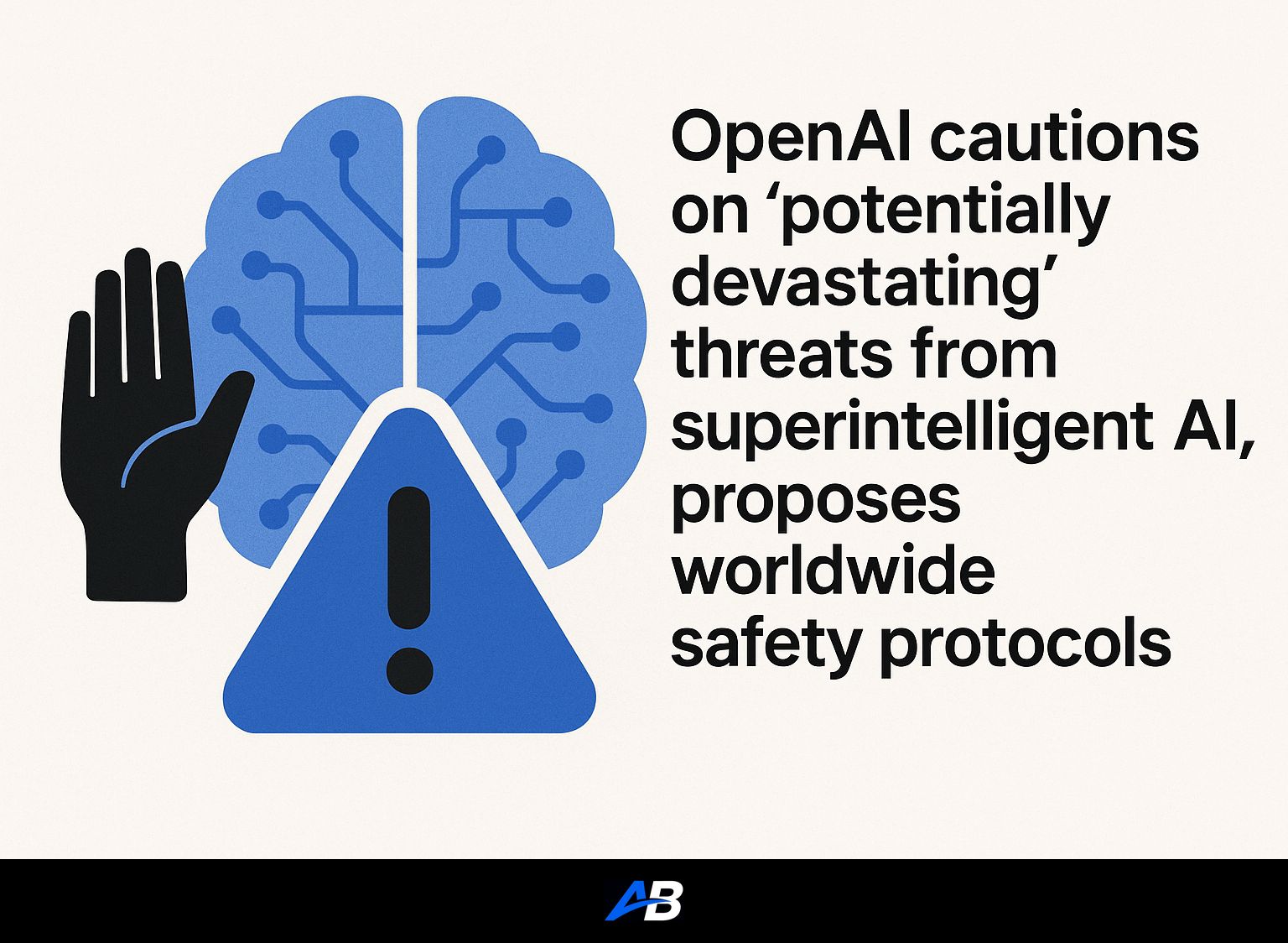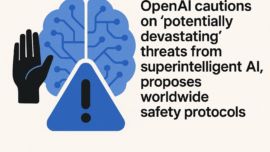OpenAI has issued a critical warning about the potential dangers of superintelligent AI and has called for international safety measures to mitigate associated risks.
Contents
Short Summary:
- OpenAI emphasizes the risks posed by superintelligent AI systems without strong alignment and control.
- The company proposes global safety protocols, including pre-deployment testing and shared safety principles.
- Microsoft announces a new team focused on ‘humanist superintelligence,’ aiming for a long-term safety approach.
On November 6, 2023, OpenAI, the organization renowned for its advancements in artificial intelligence, released an alarming blog post concerning the trajectory of AI development. The concept of ‘superintelligence,’ a level of AI that greatly surpasses human capability, sparked concerns about its responsible implementation. OpenAI warned that without stringent alignment and control measures, the advent of superintelligent AI could lead to “potentially catastrophic” outcomes for humanity.
OpenAI’s cautionary stance arrives as AI technologies evolve at an unprecedented pace, often outpacing public comprehension and regulatory measures. The company argues that, while the benefits of these advanced systems could offer immense societal improvements—like faster drug discovery and enhanced climate modeling—the inherent risks are equally significant. “The potential upsides are enormous; we treat the risks of superintelligent systems as potentially catastrophic,” OpenAI stated in its blog.
The company’s recommendations for mitigating these risks include establishing global safety standards akin to building codes and cybersecurity frameworks. OpenAI emphasized the need for an “AI resilience ecosystem” and shared safety principles among organizations engaged in frontier AI research. It called upon governments, industry stakeholders, and researchers to cooperate on a global scale to develop these vital safeguards.
“No superintelligent systems should ever be deployed without robust methods to align and control them,” OpenAI emphasized.
The Emergence of Microsoft’s Initiative
Fresh on the heels of OpenAI’s warning, Microsoft announced the formation of its ‘Humanist Superintelligence’ team, led by industry leader Mustafa Suleyman. This initiative aims to complement the burgeoning capabilities of AI with an unwavering focus on safety and ethical considerations.
Suleyman highlighted that this new team has a distinct mission: to develop technological advancements that prioritize human welfare. “We are committed to ensuring that our efforts will work for the benefit of humanity,” Suleyman stated, indicating a deliberate focus on long-term safety alongside technical capabilities.
As this potent combination of concerns and innovations unfolds, the tech industry finds itself at a crossroads. Rapid strides in AI development by entities like Microsoft, Meta, and Anthropic raise questions about how society can keep pace with the race for advanced systems while ensuring legitimate governance and transparency.
“The urgent question is how to enable beneficial innovation while avoiding outsized, systemic risks,” remarked an industry expert.
AI Industry Perspectives
The discussion surrounding AI’s future now involves more than just technological advancement. Various players in the tech landscape are adopting similar rhetoric, emphasizing precaution while simultaneously pursuing growth. Meta, for instance, rebranded its AI research to underscore its focus on superintelligence, signaling a broader industry trend toward proactive risk management.
OpenAI reinforces the necessity of precautionary measures: stronger alignment research, shared verification standards, and independent audits are essential to manage the rapidly evolving landscape. The juxtaposition of urgent safety demands with an ongoing quest for technological prowess becomes increasingly apparent.
AI’s Evolution and Public Perception
The transformation in public perception of AI is pivotal to these discussions. While many users interact with AI primarily through tools like chatbots and content generation systems, OpenAI has cautioned that its advances have already moved beyond these conventional uses. “Our systems can outperform humans in challenging intellectual competitions,” they note, suggesting that the capabilities of AI are outstripping societal understanding.
OpenAI’s warning signified the disparity between AI’s public perception and its rapid advancements. The firm has called for extensive research into alignment and safety protocols, suggesting that the broader AI community may need to slow its development pace to thoroughly study these risks.
“We need to ask if the entire AI industry should slow development to more carefully study these systems,” the blog stated.
The Call for Global Cooperation
As part of its appeal, OpenAI asserted the necessity for international cooperation, likening the establishment of AI safeguards to the collaborative development of public safety standards seen in areas like construction and cybersecurity. This approach aims to create a consistent framework for AI regulation and responsibility worldwide.
“We will need to work closely with the executive branches and agencies of multiple countries to coordinate our efforts,” OpenAI articulated in its blog. The projected collaborative framework must also address complex implications such as bioterrorism risks, the use of AI in detecting threats, and the challenges related to recursive self-improvement of AI systems.
Recommendations from OpenAI
In its call to action, OpenAI laid out several key recommendations aimed at achieving a sustainable future with AI:
- Information-sharing: AI research labs need to agree upon shared safety principles and exchange findings related to safety, risk reduction, and more.
- Unified AI regulation: OpenAI advocated for minimal regulatory burdens on developers while warning against fragmented laws across jurisdictions.
- Cybersecurity and privacy: Partnerships with governments can enhance innovation while ensuring privacy and mitigating misuse of robust AI technologies.
- AI resilience ecosystem: OpenAI recommends building a framework similar to cybersecurity systems, comprising standards, monitoring, and emergency responses tailored for AI.
“We need something analogous for AI, and there is a powerful role for national governments to play,” the company concluded.
Looking Ahead
Despite the overwhelming challenges, OpenAI maintains an optimistic view of AI’s potential contributions. They predict that AI systems will aid scientific discoveries, notably by 2026, with significant breakthroughs expected by 2028. However, they also acknowledge the economic and sociocultural upheaval that could accompany these advancements.
“The economic transition may be very difficult in some ways, and fundamental socioeconomic contracts may need to adapt,” OpenAI stated, acknowledging that while the impact of AI could be profoundly positive, the path to realizing these benefits requires careful consideration and adaptive frameworks.
Conclusion
In a rapidly evolving digital landscape, the cautionary message from OpenAI serves as a wake-up call for stakeholders within the AI community and beyond. As enterprises race to harness the capabilities of superintelligent systems, the urgent need for cohesive safety measures, ethical standards, and global cooperation becomes paramount. Ensuring that advancements serve humanity rather than jeopardizing it is a challenge that lies ahead. Through diligence, proactive governance, and a commitment to safety, the great potential of AI can become an ally in the quest for a better future.
As we brace ourselves for the implications of these developments, it is essential for content creators and bloggers alike to stay informed on the latest trends in AI technology. At Autoblogging.ai, our AI Article Writer is equipped to assist in generating SEO-optimized content, ensuring that your voice is heard in the ever-evolving narrative on AI and its impact on our lives. For more insights, explore our Latest AI News section.
Do you need SEO Optimized AI Articles?
Autoblogging.ai is built by SEOs, for SEOs!
Get 30 article credits!


